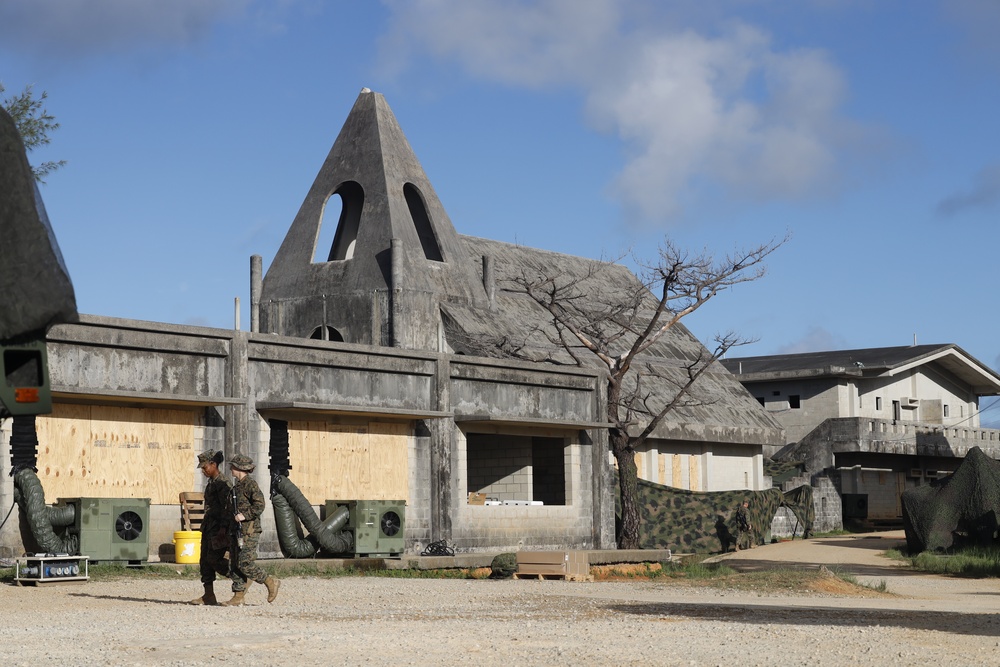OKINAWA, Japan – The rain flies covering over one hundred tents flap in the steamy Okinawa breeze. Dust swirls across the gravel streets of III Marine Expeditionary Force’s operations at the Combat Town training site on Camp Hansen, Okinawa, Japan. Inside the cinderblock buildings, originally built to support urban combat training, the glow of laptop screens and hardline phone chatter cut through the heat waves. Marines hunch over maps, tracking units, and pushing information across networks that connect from the mock village to units hundreds of miles away.
For five days, from Sept. 12 to Sept. 16, 2025, III MEF Marines and Sailors traded air conditioning and office chairs for the realities of expeditionary command and control. The mission: Test the MEF staff’s ability to displace, set up, and operate as a fully functional command post anytime and in any austere environment, the kind of situation they might face if conflict disrupted established command centers.
For III MEF, displacement could be the difference in surviving and winning in future wars. This command post exercise, as part of Resolute Dragon 25, proved that Marines can pack up, move, and reestablish command and control nodes in any terrain, all while maintaining communication links and operational awareness.
“The value of this field CPX is significantly higher than traditional, infrastructure-dependent CPXs,” said Master Gunnery Sgt. Andy Anderson, III MEF operations chief. “While exercises like Yama Sakura, Freedom Shield, and Keen Edge are vital for interoperability and procedural validation with our bilateral and joint partners, they often operate within a relatively stable and predictable environment.”
While the training looked like organized chaos to outsiders – tents sprouting up overnight, dust and sweat covered Marines weaving cables through mud and up multi-story structures – it was in fact a carefully rehearsed symphony of survivability.
Anderson explains why the CPX intentionally removed standard infrastructure support\.
“It forces Marines and Sailors of III MEF to confront the realities of limited bandwidth, degraded communications, and the need for self-reliance,” said Anderson. “This builds resilience, fosters innovation in problem-solving, and validates our ability to operate in a truly contested environment. It’s a shift from validating what we do to validating how we do it under duress. This exercise is about proving we can maintain mission effectiveness when denied the advantages we often take for granted.”
Conditions were deliberately tough. Marines slept in tents under the sweltering Okinawa summer heat reaching 90 degrees and 90 percent humidity, where “minimal air conditioning” was the understatement of the week. Showers were baby wipes, field chow was the menu, and hydration was the soup de jour.
“The training is to prepare us for the most likely and most challenging scenarios – operating in contested, austere environments,” said Anderson. “We must train as we will fight. That said however, we will continue to leverage existing infrastructure for specific aspects of training.”
The exercise demonstrated that command and control, central to military operations, can function outside traditional headquarters.
From within the cinderblock buildings, Marines coordinated logistics convoys, monitored notional maritime activity, and synchronized simulated joint and bilateral operations with partner forces.
“It’s more than just an exercise; it’s a demonstration of III MEF’s commitment to maintaining a high state of readiness and our ability to operate effectively in any environment,” said Anderson. “We want our allies and partners to understand that III MEF is actively preparing to meet the challenges of the 21st-century security landscape.”
This approach reflects a larger shift in Marine Corps doctrine: distributed, survivable, and mobile command posts instead of large, centralized headquarters that are vulnerable to modern long-range fires.
At the end of the CPX, III Marine Support Battalion packed up the entire MEF footprint and displaced to yet another location, further showing III MEF’s ability to continue to rapidly set up command and control.
Resolute Dragon is not just about Okinawa. It’s about the wider region, the evolving threat environment, and the role III MEF plays as the forward-deployed Marine Corps element in the Indo-Pacific.
If this exercise serves as any indication, III MEF is more than ready.
“It’s encouraging to see the progress we’ve made,” said Lt. Gen. Roger Turner, III MEF commanding general. “I look forward to future training exercises to achieve maximum deterrence [against open conflict]. And if that fails, we have to be ready to ‘Fight Now’.”
Date Taken:
09.16.2025
Date Posted:
09.15.2025 03:11
Story ID:
548120
Location:
CAMP HANSEN, OKINAWA, JP
Web Views:
32
Downloads:
1
PUBLIC DOMAIN

This work, III Marine Expeditionary Force proves readiness in command post field training exercise during Resolute Dragon 25, by GySgt Daniel Wetzel, identified by DVIDS, must comply with the restrictions shown on https://www.dvidshub.net/about/copyright.


AloJapan.com